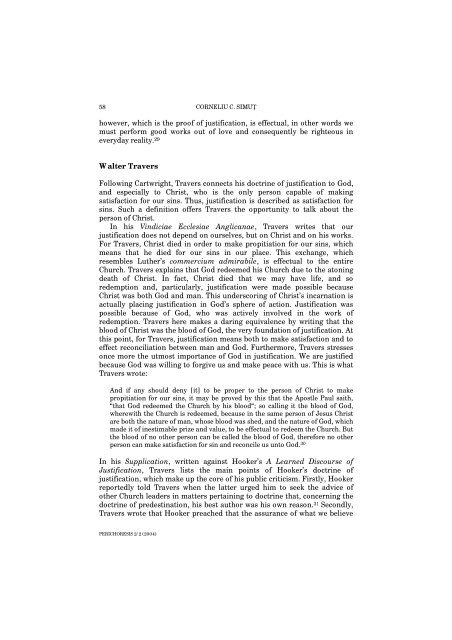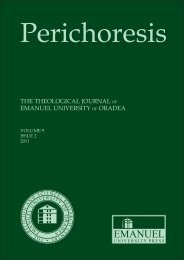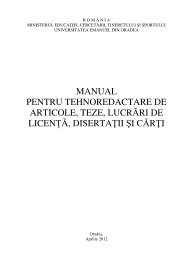Paradise Lost - Universitatea "Emanuel"
Paradise Lost - Universitatea "Emanuel"
Paradise Lost - Universitatea "Emanuel"
You also want an ePaper? Increase the reach of your titles
YUMPU automatically turns print PDFs into web optimized ePapers that Google loves.
58<br />
PERICHORESIS 2/2 (2004)<br />
CORNELIU C. SIMUŢ<br />
however, which is the proof of justification, is effectual, in other words we<br />
must perform good works out of love and consequently be righteous in<br />
everyday reality. 29<br />
Walter Travers<br />
Following Cartwright, Travers connects his doctrine of justification to God,<br />
and especially to Christ, who is the only person capable of making<br />
satisfaction for our sins. Thus, justification is described as satisfaction for<br />
sins. Such a definition offers Travers the opportunity to talk about the<br />
person of Christ.<br />
In his Vindiciae Ecclesiae Anglicanae, Travers writes that our<br />
justification does not depend on ourselves, but on Christ and on his works.<br />
For Travers, Christ died in order to make propitiation for our sins, which<br />
means that he died for our sins in our place. This exchange, which<br />
resembles Luther’s commercium admirabile, is effectual to the entire<br />
Church. Travers explains that God redeemed his Church due to the atoning<br />
death of Christ. In fact, Christ died that we may have life, and so<br />
redemption and, particularly, justification were made possible because<br />
Christ was both God and man. This underscoring of Christ’s incarnation is<br />
actually placing justification in God’s sphere of action. Justification was<br />
possible because of God, who was actively involved in the work of<br />
redemption. Travers here makes a daring equivalence by writing that the<br />
blood of Christ was the blood of God, the very foundation of justification. At<br />
this point, for Travers, justification means both to make satisfaction and to<br />
effect reconciliation between man and God. Furthermore, Travers stresses<br />
once more the utmost importance of God in justification. We are justified<br />
because God was willing to forgive us and make peace with us. This is what<br />
Travers wrote:<br />
And if any should deny [it] to be proper to the person of Christ to make<br />
propitiation for our sins, it may be proved by this that the Apostle Paul saith,<br />
“that God redeemed the Church by his blood“; so calling it the blood of God,<br />
wherewith the Church is redeemed, because in the same person of Jesus Christ<br />
are both the nature of man, whose blood was shed, and the nature of God, which<br />
made it of inestimable prize and value, to be effectual to redeem the Church. But<br />
the blood of no other person can be called the blood of God, therefore no other<br />
person can make satisfaction for sin and reconcile us unto God. 30<br />
In his Supplication, written against Hooker’s A Learned Discourse of<br />
Justification, Travers lists the main points of Hooker’s doctrine of<br />
justification, which make up the core of his public criticism. Firstly, Hooker<br />
reportedly told Travers when the latter urged him to seek the advice of<br />
other Church leaders in matters pertaining to doctrine that, concerning the<br />
doctrine of predestination, his best author was his own reason. 31 Secondly,<br />
Travers wrote that Hooker preached that the assurance of what we believe




